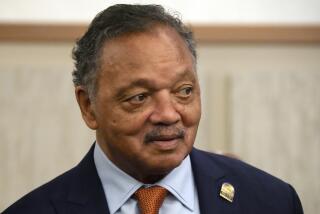Gifts to Keep PUSH Open, Jackson Says : Civil Rights: The organization has a $350,000 deficit and laid off its staff last week, but it has gotten donations and pledges totaling $250,000.
- Share via
CHICAGO — A week after Operation PUSH laid off its entire staff because of financial difficulties, the Rev. Jesse Jackson said Thursday that the civil rights organization he founded 20 years ago would continue operating, thanks to an economic bailout by black churches and businesses.
Jackson said businesses had contributed or pledged $150,000 at a meeting earlier in the day and another $100,000 had been pledged by about 75 ministers who met at a Chicago church the previous night.
Calling the contributions “bailout money,” Jackson said they would reduce PUSH’s $350,000 deficit. In addition, he said, to help the organization meet its expenses he would seek long-term commitments “from people we have served.”
“PUSH across the years has been a servant that stood tall to go to the community’s rescue,” he said at a press conference, surrounded by about 60 business leaders and PUSH officials from around the country. “Today the community has come together to PUSH’s side for rescue and for a continuation of service.”
The 12 staff members who were laid off last week have remained on the job without pay, allowing the organization to remain in operation, and Jackson said they could not yet be rehired.
Jackson founded PUSH, which stands for People United to Serve Humanity, in 1971 to encourage corporations to hire and promote blacks and to contract with black businesses. The organization also has several subsidiaries, such as one that deals with educational issues.
Economic boycotts have been the organization’s primary weapon, but a boycott last year of Nike Inc., the athletic shoe manufacturer, failed to gain unified black support, leading to speculation that the organization had been weakened by Jackson’s departure and by the appointment of the Rev. Tyrone Crider, a young minister, as executive director in 1989.
The organization, housed in an aging complex on Chicago’s South Side, provided the platform for Jackson’s emergence in the 1970s as the pre-eminent national spokesman for black political and social causes.
Some have charged that it was Jackson’s departure in the mid-1980s to run for the presidency and his recent move to Washington that most hurt the organization’s influence and finances.
Jackson said, though, that economic recession was the culprit.
“These are tough times,” he said. “For a long time we’ve operated with maximum service on a minimum budget. It’s just that so many people who once supported us are now out of business or unemployed.”
Crider said at a public PUSH meeting Saturday that the organization’s annual budget is $1.5 million.
At Thursday’s press conference, Jackson was vague about what steps would be taken to keep the organization on firm financial ground, except to say that he would continue to work with black business leaders to raise money.
Part of the plan, however, apparently involves an effort to sharpen the organization’s focus. PUSH officials have discussed ways of restructuring the organization to make it more effective.
Jackson gave up leadership of PUSH in 1984 to seek the Democratic presidential nomination. Although he continues to make regular Chicago appearances in connection with PUSH, he moved to Washington in 1989, where he now serves as “shadow senator” on behalf of the District of Columbia.
PUSH had financial problems even when Jackson was at its helm, however, and there have been signs of its declining influence for several years. For example, in Chicago’s 1989 mayoral elections, Jackson tried but failed to mend divisions that had developed in the black political community after the 1988 death of Harold Washington, the city’s first black mayor.
As a result of that disunity, Richard M. Daley, a white who was viewed by many blacks as indifferent to their concerns, was elected to serve the remainder of Washington’s second term in office.
More to Read
Sign up for Essential California
The most important California stories and recommendations in your inbox every morning.
You may occasionally receive promotional content from the Los Angeles Times.













